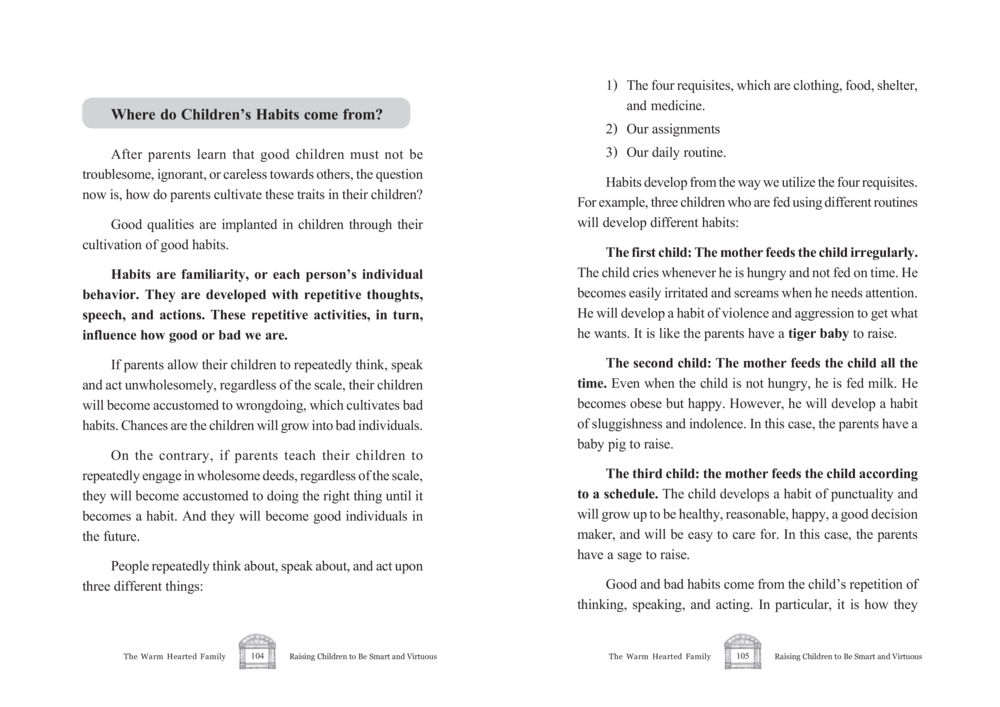The Origins of Children's Habits : หน้า 53/207
The Warm Hearted Family : หน้า 53/207 Explore how children's habits are formed through parental guidance and repetition of thoughts, speech, and actions.
1 ครั้ง

สรุปเนื้อหา
บทความนี้สำรวจแหล่งที่มาของนิสัยในเด็กว่ามาจากไหน โดยเน้นการมีส่วนร่วมของพ่อแม่ในการปลูกฝังนิสัยที่ดีในเด็กผ่านการทำซ้ำคิด พูด และกระทำ ผู้ที่สร้างนิสัยที่ดีจะกลายเป็นบุคคลที่ดีในอนาคต ในขณะที่ผู้ที่ปลูกฝังนิสัยไม่ดีอาจเติบโตขึ้นมาเป็นคนที่ไม่ดี การเลี้ยงดูของพ่อแม่มีผลต่อสุขภาพจิตและการตัดสินใจของเด็ก ซึ่งจะถูกชี้นำโดยการใช้ชีวิตประจำวันและนิสัยในการดำเนินชีวิต
หัวข้อประเด็น
-การพัฒนานิสัยในเด็ก
-บทบาทของพ่อแม่
-นิสัยที่ดีและไม่ดี
-การสอนและการปลูกฝัง
-ผลกระทบต่ออนาคตเด็ก
ข้อความต้นฉบับในหน้า
Where do Children’s Habits come from?
After parents learn that good children must not be troublesome, ignorant, or careless towards others, the question now is, how do parents cultivate these traits in their children?
Good qualities are implanted in children through their cultivation of good habits.
Habits are familiarity, or each person’s individual behavior. They are developed with repetitive thoughts, speech, and actions. These repetitive activities, in turn, influence how good or bad we are.
If parents allow their children to repeatedly think, speak and act unwholesomely, regardless of the scale, their children will become accustomed to wrongdoing, which cultivates bad habits. Chances are the children will grow into bad individuals.
On the contrary, if parents teach their children to repeatedly engage in wholesome deeds, regardless of the scale, they will become accustomed to doing the right thing until it becomes a habit. And they will become good individuals in the future.
People repeatedly think about, speak about, and act upon three different things:
The Warm Hearted Family 104 Raising Children to Be Smart and Virtuous
1) The four requisites, which are clothing, food, shelter, and medicine.
2) Our assignments
3) Our daily routine.
Habits develop from the way we utilize the four requisites. For example, three children who are fed using different routines will develop different habits:
The first child: The mother feeds the child irregularly.
The child cries whenever he is hungry and not fed on time. He becomes easily irritated and screams when he needs attention. He will develop a habit of violence and aggression to get what he wants. It is like the parents have a tiger baby to raise.
The second child: The mother feeds the child all the time. Even when the child is not hungry, he is fed milk. He becomes obese but happy. However, he will develop a habit of sluggishness and indolence. In this case, the parents have a baby pig to raise.
The third child: the mother feeds the child according to a schedule. The child develops a habit of punctuality and will grow up to be healthy, reasonable, happy, a good decision maker, and will be easy to care for. In this case, the parents have a sage to raise.
Good and bad habits come from the child's repetition of thinking, speaking, and acting. In particular, it is how they
Tags : #เด็ก #นิสัย #การเลี้ยงดู #พ่อแม่ #คุณธรรม
หน้าหนังสือทั้งหมด

1

2

3

4

5

6

7

8

9

10

11

12

13

14

15

16

17

18

19

20

21

22

23

24

25

26

27

28

29

30

31

32

33

34

35

36

37

38

39

40

41

42

43

44

45

46

47

48

49

50

51

52

53

54

55

56

57

58

59

60

61

62

63

64

65

66

67

68

69

70

71

72

73

74

75

76

77

78

79

80

81

82

83

84

85

86

87

88

89

90

91

92

93

94

95

96

97

98

99

100

101

102

103

104

105

106

107

108

109

110

111

112

113

114

115

116

117

118

119

120

121

122

123

124

125

126

127

128

129

130

131

132

133

134

135

136

137

138

139

140

141

142

143

144

145

146

147

148

149

150

151

152

153

154

155

156

157

158

159

160

161

162

163

164

165

166

167

168

169

170

171

172

173

174

175

176

177

178

179

180

181

182

183

184

185

186

187

188

189

190

191

192

193

194

195

196

197

198

199

200

201

202

203

204

205

206

207
หนังสือที่เกี่ยวข้อง
Load More
